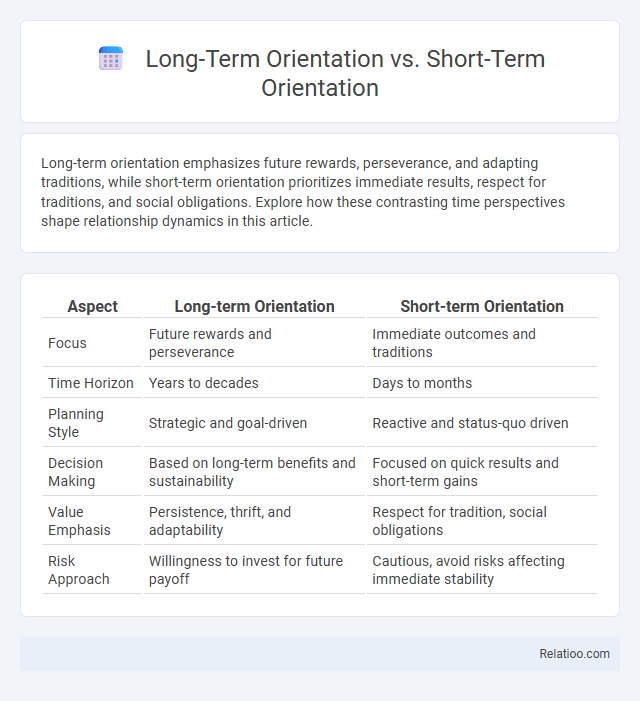Long-term orientation emphasizes future rewards, perseverance, and adapting traditions, while short-term orientation prioritizes immediate results, respect for traditions, and social obligations. Explore how these contrasting time perspectives shape relationship dynamics in this article.
Table of Comparison
| Aspect | Long-term Orientation | Short-term Orientation |
|---|---|---|
| Focus | Future rewards and perseverance | Immediate outcomes and traditions |
| Time Horizon | Years to decades | Days to months |
| Planning Style | Strategic and goal-driven | Reactive and status-quo driven |
| Decision Making | Based on long-term benefits and sustainability | Focused on quick results and short-term gains |
| Value Emphasis | Persistence, thrift, and adaptability | Respect for tradition, social obligations |
| Risk Approach | Willingness to invest for future payoff | Cautious, avoid risks affecting immediate stability |
Introduction to Long-term vs Short-term Orientation
Long-term orientation emphasizes perseverance, thrift, and future rewards, while short-term orientation values respect for tradition, social obligations, and quick results. This cultural dimension influences decision-making, goal-setting, and time perception across societies, shaping business practices and interpersonal relationships. Understanding these differences helps navigate cross-cultural interactions and fosters effective communication.
Defining Long-term and Short-term Orientation
Long-term Orientation emphasizes perseverance, thrift, and sustainable success, often linked to cultures valuing future rewards and traditions. Short-term Orientation prioritizes immediate results, social obligations, and respect for tradition, reflecting societies focused on quick outcomes and maintaining current social norms. Understanding these orientations reveals deep cultural differences influencing business strategies, decision-making, and interpersonal relationships across global contexts.
Historical Background and Cultural Roots
Long-term orientation stems from Confucian values emphasizing perseverance and respect for tradition, shaping East Asian cultures with a focus on future rewards and sustained efforts. Short-term orientation, prevalent in Western societies, reflects historical experiences favoring quick results and maintaining social stability through immediate achievements. These contrasting cultural roots influence how societies prioritize goals, adapt to change, and value time, illustrating the profound impact of historical context on cultural differences.
Key Characteristics of Long-term Oriented Societies
Long-term oriented societies prioritize perseverance, thrift, and future rewards, emphasizing sustained efforts and adaptation over time. They value virtues such as patience, respect for tradition, and a pragmatic approach to changing circumstances, contrasting with short-term oriented cultures that focus on immediate results and quick gains. Understanding these cultural differences helps you navigate international interactions with greater sensitivity and effectiveness.
Traits of Short-term Oriented Societies
Short-term oriented societies emphasize immediate results, valuing traditions, social obligations, and quick rewards over long-term planning. You may observe a strong focus on respect for established norms, a preference for maintaining social stability, and a tendency to prioritize present-day needs rather than future gains. These cultural traits create distinct behaviors compared to long-term oriented societies, where perseverance and adaptive foresight are more prominent.
Impact on Business Strategies
Long-term orientation emphasizes perseverance, thrift, and adapting to changing circumstances, encouraging businesses to invest in sustainable growth and future rewards. Short-term orientation prioritizes quick results, immediate gains, and respect for tradition, leading companies to focus on rapid returns and maintaining established practices. Understanding these cultural differences enables you to tailor business strategies effectively, aligning with local values to drive success and competitive advantage.
Influence on Personal Values and Relationships
Long-term orientation emphasizes perseverance, thrift, and adapting traditions to modern contexts, shaping personal values around future rewards and sustained relationships. Short-term orientation prioritizes respect for tradition, fulfilling social obligations, and immediate results, influencing values toward quick outcomes and maintaining established social bonds. Your understanding of these cultural differences enhances interpersonal dynamics by aligning expectations in personal and professional relationships.
Long-term vs Short-term Orientation in Education
Long-term orientation in education emphasizes perseverance, adaptation, and the value of sustained effort over immediate results, fostering skills like critical thinking and future planning. In contrast, short-term orientation prioritizes quick achievements and respect for tradition, often focusing on rote learning and standardized testing. These cultural differences shape educational systems by influencing teaching methods, assessment styles, and student motivation across various societies.
Effects on Economic Development and Innovation
Long-term orientation fosters steady investments in education, infrastructure, and research, promoting sustainable economic growth and breakthrough innovation, while short-term orientation often prioritizes immediate results, leading to quicker returns but limited long-term development. Cultural differences in time perspective influence how societies allocate resources and manage risk, with long-term oriented cultures encouraging patience and resilience, enhancing competitiveness in global markets. Your strategic decisions should consider these cultural dimensions to align innovation efforts with economic goals and maximize productivity.
Navigating Cross-cultural Communication
Navigating cross-cultural communication requires understanding the dynamics of long-term orientation versus short-term orientation, which reflect different values regarding time, planning, and traditions. Your ability to recognize that long-term oriented cultures prioritize perseverance, future rewards, and sustained relationships, while short-term oriented cultures emphasize immediate results, adaptability, and respect for current social hierarchies, enhances effective interaction. Mastering these cultural differences improves collaboration, reduces misunderstandings, and builds trust in diverse global environments.

Infographic: Long-term Orientation vs Short-term Orientation
 relatioo.com
relatioo.com